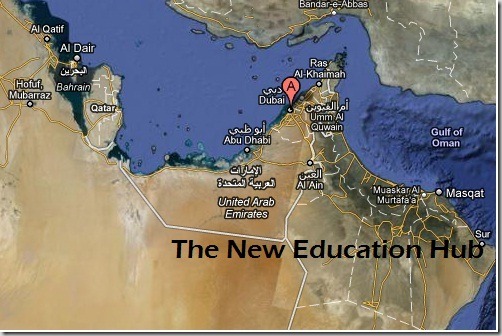Can the land of oil wells ever be known for providing world class education?
To be honest, the Gulf countries are already on their way to house mushrooming universities and world class education facility centers. The idea behind investing heavily in education is of course, for UAE to retain their home grown talent, attract foreign investment, build an international reputation, ensure productive employment of citizens and reduce dependence on oil as an economy.
Out of the 7 emirates that makeup the UAE, here are some major highlights on the ones that are posed to be education hubs of the future.

Contents
Dubai
Not only has Dubai become a smashing tourist destination with its jazzy infrastructure and hoteling industry, but it has also come into international limelight for the number of International Branch Campuses (IBCs) it houses.
One of the main reasons for it to strategize this way is to serve its growing expatriate population, and attract foreign students. Through business clusters like Dubai International Academic City (DIAC), Dubai Silicon Oasis (DSO), Dubai Health Care City (DHCC) and Dubai International Finance City (DIFC), some of the best universities have decided to get a second home here.
You’ll be amazed to know that more than 25 International Branch Campuses representing 13 different national curriculums of PG and UG courses are offered though the education hub in Dubai. DIAC currently hosts more than 30 institutions from 13 different countries.
Closer home, you might have heard of students opting management courses at the S P Jain Centre of Management studies in the Dubai campus. This works out to be fantastic for Indian students because Dubai is relatively closer home, the brand name of the institution is familiar and the international exposure can look great on the resume.
As you might have guessed, DHCC, DIFC and DSO specialize in courses of health care, finance and hospitality respectively. Most parts of these education hubs were established in and around 2003 onwards.
Abu Dhabi
Although Abu Dhabi has not been overtly successful in attracting foreign universities as much as Dubai has, it has managed to get two substantial names on board. The University of Sorbonne (France) and New York University (USA) currently run in Abu Dhabi.
According to Minister of Higher Education and Scientific Research of this emirate, Abu Dhabi wants to attract reputable names and follow the rule of quality over quantity. They want to increase the availability of technical courses and foster entrepreneurship.
Qatar & Bahrain
Qatar houses an IBC of Cornell University and Carnegie Mellon University. Bahrain too, offers academic programs courses but is still in its infancy to be called an education hub.
Is this a fad or is it for real?
Like every other topic attracts criticisms and comments, the topic of Gulf countries posed for becoming education hubs too get under the scanner now and then. Here are a few concerns:
- There are a few visa issues that the Government of UAE needs to sync with the unprecedented growth in education facilities. After students graduate, they are required to find a job or a sponsor within 30 days, otherwise they may become homeward bound.
- Other student benefits such as part time work permits, low cost accommodation options etc. are areas that need more consideration.
- Accreditations are still not complete. Though foreign universities are accredited in their home countries and by local authorities, federal higher education departments in UAE are still in the process of accrediting them.
- Dubai’s growing hospitality and fashion industry has allowed a lot of short term summer courses to mushroom, but enough attention had not been paid to doctoral and research based programs.
- The quality of education needs to be consistently benchmarked and reviewed. Recently, there were a few cases of Dubai-graduated students failing to get through Masters Programs elsewhere.
Will Gulf countries become knowledge economies in the next 10 years? Only time will tell!
What do you think?

Dubai has truly become the new education hub for many who look forward to do higher education. And S P Jain Center of Management is surely the right place to be as it is well known for quality education.
When initial petrodollars started pouring in, the primary impulsive reaction of the GCC nations is to invest in their infrastructure. They poured most of their incomes into world class roads, bridges, housing, airports, hospitals etc.
When they got enough infrastructure to satisfy their needs for next 20 years, their concern for their money was based on the fact that in future oil is going to run out. Their concept was to invest in global economy so that the investments can keep generating returns when oil income starts to fall down.
Now the third generation think tank of GCC nations feels that the real asset is not the properties bought abroad. Its their people. They realized that if educated, their citizens can sustain the nations.
I think its 90s when they concentrated in developing their education system by inviting western universities / colleges to have GCC Branches.
The following is the link to a newly built campus of a University for Wemen in Saudi.
A design company in Dubai where one of my classmate is working participated in the project.
Please note that some part of design of the Project is done in Pune.
Here is the link for the Homepage of the University :
http://www.pnuproject.com/
It is interesting tonote that Education is considered high priority in the UAE.